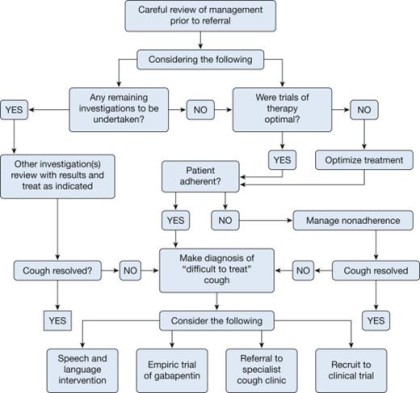- Home
- Editorial
- News
- Practice Guidelines
- Anesthesiology Guidelines
- Cancer Guidelines
- Cardiac Sciences Guidelines
- Critical Care Guidelines
- Dentistry Guidelines
- Dermatology Guidelines
- Diabetes and Endo Guidelines
- Diagnostics Guidelines
- ENT Guidelines
- Featured Practice Guidelines
- Gastroenterology Guidelines
- Geriatrics Guidelines
- Medicine Guidelines
- Nephrology Guidelines
- Neurosciences Guidelines
- Obs and Gynae Guidelines
- Ophthalmology Guidelines
- Orthopaedics Guidelines
- Paediatrics Guidelines
- Psychiatry Guidelines
- Pulmonology Guidelines
- Radiology Guidelines
- Surgery Guidelines
- Urology Guidelines
Treatment of Unexplained Chronic Cough: CHEST Guidelines

Persistent cough of unexplained origin is a significant health issue that occurs in up to 5% to 10% of patients seeking medical assistance for a chronic cough and from 0% to 46% of patients referred to specialty cough clinics. Patients with unexplained chronic cough (UCC) experience significant impairments in quality of life. They endure a chronic cough that persists, often for many months or years, despite systematic investigation and treatment of known causes. There is hence a strong need to identify effective treatment approaches for UCC. In addition, it is essential to distinguish the cough experienced by these patients from cough that can be explained and effectively treated because incomplete investigation or inadequate treatment will also result in a persistent cough that seems to be unexplained.
UCC represents a clinically significant chronic cough that persists despite appropriate investigation and treatment. It can occur under three different circumstances: (1) chronic cough with no diagnosable cause (UCC), (2) explained but refractory chronic cough, and (3) unexplained and refractory chronic cough. When patients with chronic cough undergo investigation and the results of these investigations do not identify a cause of their cough, this condition is termed UCC.
In the month of January 2016, American College of Chest Physicians published the "Treatment of Unexplained Chronic Cough: CHEST Guidelines and and Expert Panel Report"
The major recommendations of the report are as follows:-
1. In adult patients with chronic cough, guidelines suggest that unexplained chronic cough be defined as a cough that persists longer than 8 weeks, and remains unexplained after investigation, and supervised therapeutic trial(s) conducted according to published best-practice guidelines (Ungraded Consensus-Based Statement).
2. In adult patients with chronic cough, guidelines suggest that patients with chronic cough undergo a guideline/protocol based assessment process that includes objective testing for bronchial hyper responsiveness and eosinophilic bronchitis, or a therapeutic cortico steroid trial (Ungraded Consensus-Based Statement).
3. In adult patients with unexplained chronic cough, we suggest a therapeutic trial of multimodality speech pathology therapy (Grade 2C).
4. In adult patients with unexplained chronic cough and negative tests for bronchial hyper responsiveness and eosinophilia (sputum eosinophils, exhaled nitric oxide), guidelines suggest that inhaled corticosteroids not be prescribed (Grade 2B).
5. In adult patients with unexplained chronic cough, guidelines suggest a therapeutic trial of gabapentin as long as the potential side effects and the risk-benefit profile are discussed with patients before use of the medication, and there is a reassessment of the risk-benefit profile at 6 months before continuing the drug (Grade 2C).
Remarks: Because health-related quality of life of some patients can be so adversely impacted by their unexplained chronic cough, and because gabapentin has been associated with improvement in quality of life in a randomized controlled clinical trial, the American College of Chest Physicians (CHEST) Cough Expert Panel believes that the potential benefits in some patients outweigh the potential side effects. With respect to dosing, patients without contraindications to gabapentin can be prescribed a dose escalation schedule beginning at 300 mg once a day with additional doses being added each day as tolerated up to a maximum tolerable daily dose of 1,800 mg a day in two divided doses.
6. Inadult patients with unexplained chronic cough and a negative workup for acid gastroesophageal reflux disease, guidelines suggest that proton pump inhibitor therapy NOT to be prescribed (Grade 2C).
The guidelines also recommend the following approach in the figure to be used for diagnosing and treating unexplained chronic cough :-
You can read the full guidelines by clicking on the following link :-
http://journal.publications.chestnet.org/article.aspx?articleid=2451211


Disclaimer: This site is primarily intended for healthcare professionals. Any content/information on this website does not replace the advice of medical and/or health professionals and should not be construed as medical/diagnostic advice/endorsement or prescription. Use of this site is subject to our terms of use, privacy policy, advertisement policy. © 2020 Minerva Medical Treatment Pvt Ltd